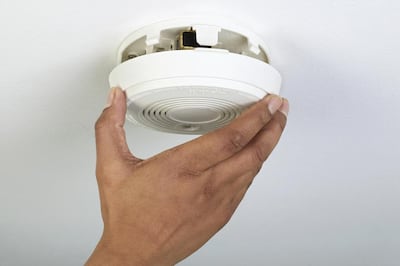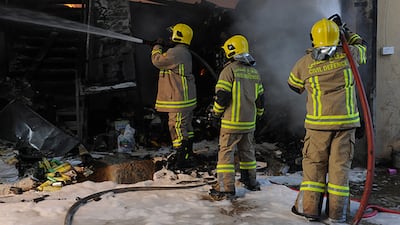More than 21,000 warnings have been issued for buildings in Abu Dhabi that have failed to adhere to fire safety regulations.
Abu Dhabi Civil Defence Authority inspected 10,753 residential and commercial buildings and centres across the emirate between May and October this year.
These included 6,994 entities in Abu Dhabi city, 3,494 in Al Ain and 265 in Al Dhafra.
Inspections led to the issuing of 21,271 warnings for buildings that were found non-compliant with fire safety requirements.
It's pivotal to assess and enhance the safety and fire prevention standards in the emirate
Brig Gen Salem Al Dhaheri,
acting director general of Abu Dhabi Civil Defence Authority
Abu Dhabi accounted for 16,053 notices, while buildings in the Al Ain region and Al Dhafra were issued 4,212 and 1,006 notices respectively.
A grace period – the duration of which was not disclosed – has also been given to property owners to rectify non-compliance issues.
The Civil Defence said it will monitor the properties during this time.
The move aims to enhance fire safety standards across the emirate of Abu Dhabi.
Brig Gen Salem Al Dhaheri, acting director general of Abu Dhabi Civil Defence Authority, lauded the initiative.
"It's pivotal to assess and enhance the safety and fire prevention standards in the emirate," he said, adding that intensified efforts made by the authority and its strategic partners have made the initiative a success.
The scheme began with inspections of residential buildings, businesses, and industrial zones, focusing on essential safety measures.
Buildings are required to install fire detectors and fire alarm systems, while maintaining service contracts with Civil Defence-approved companies, among other requirements, he said.
Field inspections also revealed that owners and investors are actively rectifying previous violations.
In an interview with Al Fujairah Radio in May, Lt Col Amir Al Otaibi, deputy chief of the inspection scheme, said the initiative was designed to examine and highlight potential hazards in buildings.
Building owners that do not adhere to fire safety regulations will face fines of up to Dh50,000, he said.
For severe non-compliance, buildings will be temporarily closed until all issues are rectified.
Civil defence teams responded to more than 3,000 incidents in 2022, according to Ministry of Interior figures.
There were 2,169 building fires, a three per cent increase from 2,090 in 2021, and a 10 per cent increase from 1,968 in 2020.
The majority of fires took place in residential areas, with villas and apartments accounting for 1,385 of the incidents.
A further 256 fires occurred in commercial buildings, 153 on farms, and 122 at public service facilities.
The figures did not include information on deaths or injuries.
Emergency services responded to about 860 fires last year in Abu Dhabi.
UAE currency: the story behind the money in your pockets
Killing of Qassem Suleimani
Founders: Abdulmajeed Alsukhan, Turki Bin Zarah and Abdulmohsen Albabtain.
Based: Riyadh
Offices: UAE, Vietnam and Germany
Founded: September, 2020
Number of employees: 70
Sector: FinTech, online payment solutions
Funding to date: $116m in two funding rounds
Investors: Checkout.com, Impact46, Vision Ventures, Wealth Well, Seedra, Khwarizmi, Hala Ventures, Nama Ventures and family offices
UK-EU trade at a glance
EU fishing vessels guaranteed access to UK waters for 12 years
Co-operation on security initiatives and procurement of defence products
Youth experience scheme to work, study or volunteer in UK and EU countries
Smoother border management with use of e-gates
Cutting red tape on import and export of food
The alternatives
• Founded in 2014, Telr is a payment aggregator and gateway with an office in Silicon Oasis. It’s e-commerce entry plan costs Dh349 monthly (plus VAT). QR codes direct customers to an online payment page and merchants can generate payments through messaging apps.
• Business Bay’s Pallapay claims 40,000-plus active merchants who can invoice customers and receive payment by card. Fees range from 1.99 per cent plus Dh1 per transaction depending on payment method and location, such as online or via UAE mobile.
• Tap started in May 2013 in Kuwait, allowing Middle East businesses to bill, accept, receive and make payments online “easier, faster and smoother” via goSell and goCollect. It supports more than 10,000 merchants. Monthly fees range from US$65-100, plus card charges of 2.75-3.75 per cent and Dh1.2 per sale.
• 2checkout’s “all-in-one payment gateway and merchant account” accepts payments in 200-plus markets for 2.4-3.9 per cent, plus a Dh1.2-Dh1.8 currency conversion charge. The US provider processes online shop and mobile transactions and has 17,000-plus active digital commerce users.
• PayPal is probably the best-known online goods payment method - usually used for eBay purchases - but can be used to receive funds, providing everyone’s signed up. Costs from 2.9 per cent plus Dh1.2 per transaction.
Fourth Arab Economic and Social Development Summit
As he spoke, Mr Aboul Gheit repeatedly referred to the need to tackle issues affecting the welfare of people across the region both in terms of preventing conflict and in pushing development.
Lebanon is scheduled to host the fourth Arab Economic and Social Development Summit in January that will see regional leaders gather to tackle the challenges facing the Middle East. The last such summit was held in 2013. Assistant Secretary-General Hossam Zaki told The National that the Beirut Summit “will be an opportunity for Arab leaders to discuss solely economic and social issues, the conference will not focus on political concerns such as Palestine, Syria or Libya". He added that its slogan will be “the individual is at the heart of development”, adding that it will focus on all elements of human capital.



